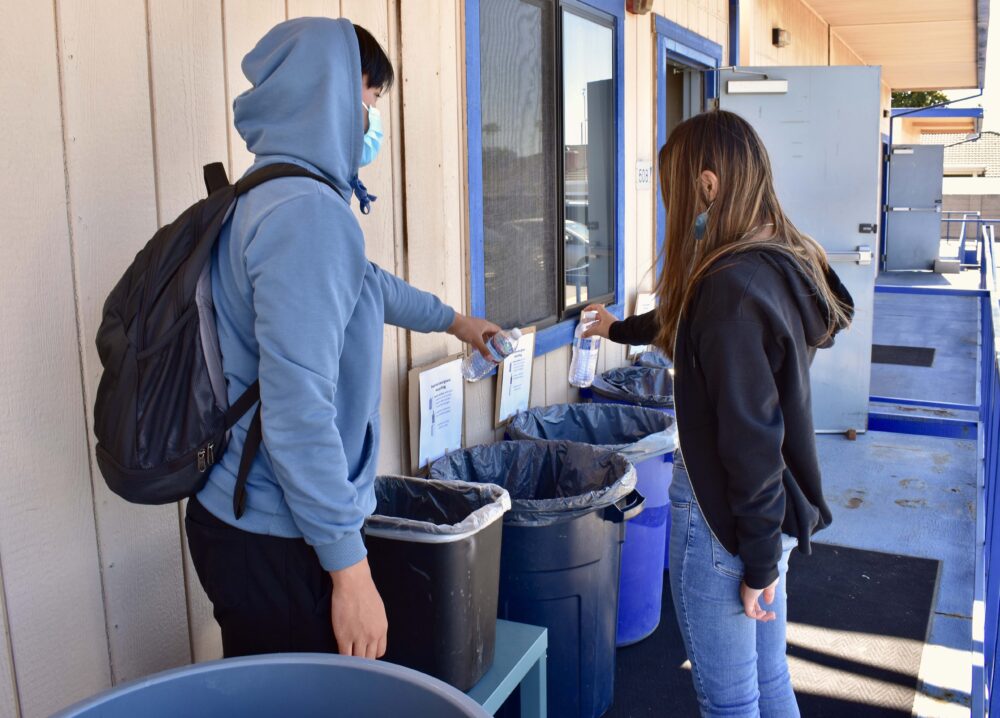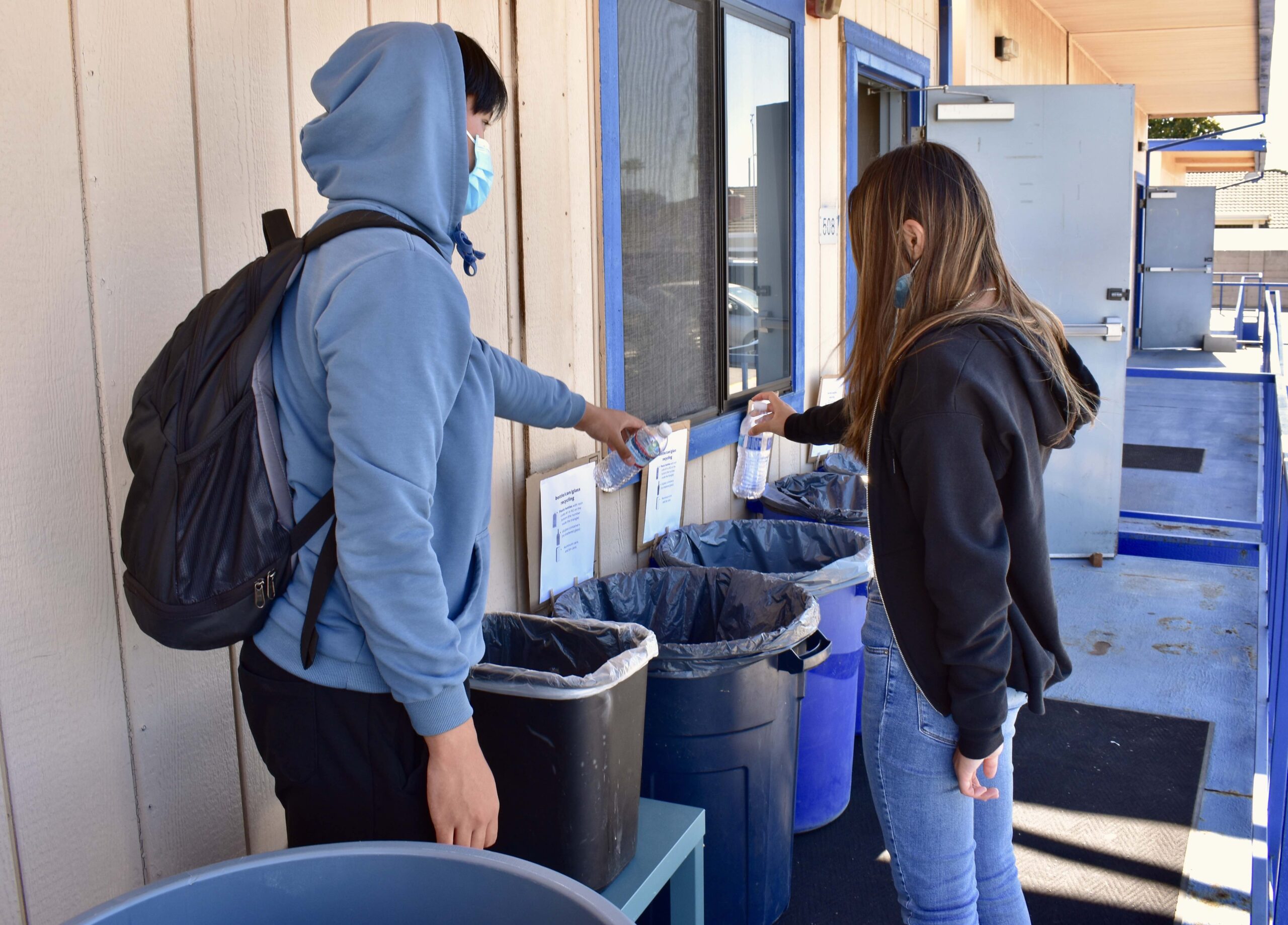
By Reese Meister and Katie Vo
AP (Advanced Placement) Environmental Science (APES) teacher Terah French and the Ecology Club, lead by co-presidents junior Giauy Ngo and senior Jessie Pham, have collaborated to revive the school recycling system and create a more sustainable community at Fountain Valley High School (FVHS).
While there was no system in place at the start of the 2021-2022 school year, recycling is not a new concept to campus. There used to be two separate programs. Typically, the Ecology Club and APES teacher collaborate to oversee the recycling systems within the classrooms while the school is in charge of the larger bins found around the school. However, too many students discarded trash in the school recycling bins and the maintenance team was unable to regulate and sort through it, resulting in the program’s end.
After nearly a year and a half away from campus, the Ecology Club and French saw an opportunity to implement a new system.
“I knew that in the past the [APES teacher] played a role in the recycling…I spoke to [French] to get it back up and running with the club, and then we changed the system; instead of having just a few students going around the school and picking it up, it’s going to be a few students picking it up and a few students delivering it to us,” Ngo said.
Former APES teacher Lisa Battig recognized both similarities and improvements to the prior system.
“I think the advent of a good drop off center is a huge plus. [Before], we were doing a lot of pickup, and I think enabling teachers to time their drop offs will be really nice and very beneficial,” Battig said.
Battig also mentioned how, in the past, she oversaw the system as the former APES teacher, but now French helps lead it with a few new ideas of her own. This year, students earn volunteer hours which can go towards earning their service cord upon graduation.
“The main change…it’s student centered, student-led, student-driven for the school. It’s not an individual project, it’s a leadership project…an opportunity to also take a program and change it to what students need and what staff need,” French said.
As a participant of the new system, Battig helped French plan the logistics in September. Teachers received their recycling boxes along with instructions throughout the week of Oct. 18, and the first collection day took place on Friday, Oct. 22. Collections will happen every Friday primarily so that nothing in the classroom will attract rodents or insects over the weekend.
APES students will collect recycling from some classrooms and bring it back to French’s room. Teachers could also opt for one of their own students to drop it off during their passing period or break.
Regardless of how the materials arrive, Ecology Club members will determine what can be recycled and sort it into two categories: bottles, cans and glass recyclables or paper. The Ecology Club then plans to deliver the first category of recycled materials to the Orange Coast College Recycling Center, while most paper will be recycled at an on-campus recycle dumpster to avoid contamination.
Certain materials have cash redemption value, which may be recycled in exchange for money, and should be separated from other materials.
Within the first week, the renewal of the program has already gained momentum with 51 teachers currently participating.
“[The level of teacher participation] is good for now, since we’re restarting [the system] from scratch…This is our first week of doing it, so it’ll be nice to figure it out with less teachers, and then, once we get the system down and tweaked, we can expand and get more teachers,” Ngo said.
French expressed similar sentiments on the importance of expansion and education.
“I would like to see if the program meets the school’s needs first, then I would like to see it grow and really continue to be a way for students to learn about systems of sustainability and see how it translates to real life,” French said. “I think what this [new program] can teach us is to be adaptable, to listen to other people and that change is necessary.
In terms of promoting sustainability, this system will bring many benefits in its ability to create a cycle of continuous use before being thrown away in the usual cycle of “production, use, landfill,” as Ngo phrased it.
“The things that are going into the regular trash cans [and] the volume of regular trash should be reduced. I believe it also [helps students] understand what can be recycled, like which things they should be conscious of going into a different stream,” Battig said. “It raises awareness.”
While Battig recognizes the significance of recycling, she also expressed a need to further progress with environmentalism in the community.
“The ideal would be no trash, no recycle…nothing left to go into [our waste production]…We [should] think beyond [recycling] to a place where our usage of anything single-use is reduced so far that we can [get] everything right back into a healthy place in the environment,” Battig said.
Ngo also has further plans for sustainability in the community, hoping to implement a compost system for organic waste in the Ecology Club garden and eventually schoolwide. He also aspires to expand the recycling system to the rest of the FVHS campus, not only in classrooms.
“[Students] should [recycle,] convince their teacher to join the recycling program [and] make sure they’re following the instructions on what can be recycled,” Ngo said.





